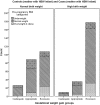Associations of neonatal high birth weight with maternal pre-pregnancy body mass index and gestational weight gain: a case-control study in women from Chongqing, China
- PMID: 27531723
- PMCID: PMC5013473
- DOI: 10.1136/bmjopen-2015-010935
Associations of neonatal high birth weight with maternal pre-pregnancy body mass index and gestational weight gain: a case-control study in women from Chongqing, China
Abstract
Objectives: To examine the associations of maternal pre-pregnancy body mass index (BMI) and gestational weight gain (GWG) with neonatal high birth weight (HBW) in a sample of Chinese women living in southwest China.
Methods: A hospital-based case-control study was conducted in Chongqing, China. A total of 221 mothers who delivered HBW babies (>4.0 kg) were recruited as cases and 221 age-matched (2-year interval) mothers with normal birth weight babies (2.5-4.0 kg) were identified as controls. ORs were estimated using conditional logistic regression analysis. For the analysis, pre-pregnancy BMI was categorised as underweight/normal weight/overweight and obesity and GWG was categorised as inadequate/appropriate/excessive.
Results: Among the cases, mean pre-pregnancy BMI was 21.8±2.8 kg/m(2), mean GWG was 19.7±5.1 kg and mean neonatal birth weight was 4.2±0.2 kg. In the controls, the corresponding values were 21.1±3.1 kg/m(2), 16.4±5.0 kg and 3.3±0.4 kg, respectively. More cases than controls gained excessive weight during pregnancy (80.1% vs 48.4%, p<0.001). No significant association was found between pre-pregnancy BMI and HBW babies (OR=1.04, 95% CI 0.97 to 1.11; p>0.05). GWG was positively related to HBW after adjustment for gravidity, gestational age, newborns' gender and family income (OR=1.18, 95% CI 1.12 to 1.25; p<0.001). The adjusted OR of delivering HBW babies was 5.39 (95% CI 2.94 to 9.89; p<0.001) for excessive GWG versus appropriate GWG. This OR was strengthened among pre-pregnancy normal weight women (OR=10.27, 95% CI 3.20 to 32.95; p<0.001).
Conclusions: Overall, the findings suggest a significantly positive association between GWG and HBW. However, pre-pregnancy BMI shows no independent relationship with HBW.
Keywords: birth weight; body mass index; case-control study; gestational weight gain; macrosomia; pregnancy.
Published by the BMJ Publishing Group Limited. For permission to use (where not already granted under a licence) please go to http://www.bmj.com/company/products-services/rights-and-licensing/
Figures
Similar articles
-
Parental Body Mass Index, Gestational Weight Gain, and Risk of Macrosomia: a Population-Based Case-Control Study in China.Paediatr Perinat Epidemiol. 2015 Sep;29(5):462-71. doi: 10.1111/ppe.12213. Epub 2015 Jul 30. Paediatr Perinat Epidemiol. 2015. PMID: 26228295
-
[Relationship between the risk of emergency cesarean section for nullipara with the prepregnancy body mass index or gestational weight gain].Zhonghua Fu Chan Ke Za Zhi. 2017 Nov 25;52(11):757-764. doi: 10.3760/cma.j.issn.0529-567X.2017.11.008. Zhonghua Fu Chan Ke Za Zhi. 2017. PMID: 29179271 Chinese.
-
Effects of pre-pregnancy body mass index and gestational weight gain on maternal and infant complications.BMC Pregnancy Childbirth. 2020 Jul 6;20(1):390. doi: 10.1186/s12884-020-03071-y. BMC Pregnancy Childbirth. 2020. PMID: 32631269 Free PMC article. Clinical Trial.
-
Association between perinatal outcomes and maternal pre-pregnancy body mass index.Obes Rev. 2016 Nov;17(11):1091-1102. doi: 10.1111/obr.12455. Epub 2016 Aug 18. Obes Rev. 2016. PMID: 27536879 Review.
-
Maternal body mass index and risk of neonatal adverse outcomes in China: a systematic review and meta-analysis.BMC Pregnancy Childbirth. 2019 Mar 29;19(1):105. doi: 10.1186/s12884-019-2249-z. BMC Pregnancy Childbirth. 2019. PMID: 30922244 Free PMC article.
Cited by
-
Association among pre-pregnancy body mass index, gestational weight gain and neonatal birth weight: a prospective cohort study in China.BMC Pregnancy Childbirth. 2020 Nov 12;20(1):690. doi: 10.1186/s12884-020-03323-x. BMC Pregnancy Childbirth. 2020. PMID: 33183261 Free PMC article.
-
Pre-pregnancy body mass index (BMI) and maternal gestational weight gain are positively associated with birth outcomes in rural Malawi.PLoS One. 2018 Oct 23;13(10):e0206035. doi: 10.1371/journal.pone.0206035. eCollection 2018. PLoS One. 2018. PMID: 30352100 Free PMC article.
-
Association of gestational weight gain rate with infant birth weight and cesarean delivery: A prospective cohort study in Nepal.PLOS Glob Public Health. 2024 Nov 11;4(11):e0003546. doi: 10.1371/journal.pgph.0003546. eCollection 2024. PLOS Glob Public Health. 2024. PMID: 39527584 Free PMC article.
-
Impact of maternal gestational weight gain in twin pregnancies on early childhood obesity risk: A longitudinal birth cohort study.Front Pediatr. 2022 Aug 2;10:906086. doi: 10.3389/fped.2022.906086. eCollection 2022. Front Pediatr. 2022. PMID: 35983080 Free PMC article.
-
Association between neonatal birthweight and risk of maternal glucose intolerance after gestational diabetes mellitus.J Diabetes Investig. 2021 Mar;12(3):425-433. doi: 10.1111/jdi.13349. Epub 2020 Aug 11. J Diabetes Investig. 2021. PMID: 32628808 Free PMC article.
References
Publication types
MeSH terms
LinkOut - more resources
Full Text Sources
Other Literature Sources
Medical

